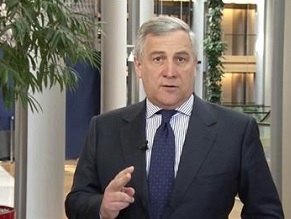|
World Jewish News

European Commission Vice-President Antonio Tajani
|
EU Commissioner Tajani pledges to strenghten industrial cooperation between the EU and Israel
23.10.2013, Israel and the World European Commission Vice-President Antonio Tajani has pledged to strengthen industrial cooperation between the EU and Israel, despite recent tensions between the two sides over the EU guidelines on funding for Israeli entities beyond the Green Line.
“We want to work with Israel today and tomorrow,” Commissioner Tajani said during his two-day visit to Israel as part of his ‘Mission for Growth’, aimed to strengthen already flourishing business relations between the EU and Israel and exploring further opportunities for cooperation between European and Israeli SMEs.
Commissioner Tajani said that his visit - Monday and Tuesday- was sending a “strong political message” to Israel that Europe wanted to partner with Israel.
Some 65 European representatives of companies and trade associations from 17 EU countries accompanied Tajani who is the EU Commissioner in charge of Industry and Entrepreneurship.
Europe is Israel’s largest trading partner, with approximately 27 per cent of Israel’s exports going to the European Union.
The Commissioner met with Israel’s President Shimon Peres, the Minister of Economy and Trade, Naftali Bennett, addressed the Water Technology and Environment Control Conference (WATEC) in Tel Aviv and exchanged views on boosting green and sustainable growth both in Israel and in the EU with Israeli Minister of Energy and Water Resources, Silvan Shalom.
A number of bilateral arrangements were agreed between the EU and Israel during the two-day enterprise trip, including a “letter of intent” on industrial cooperation and small and medium enterprises, and a Global Navigation Satellite System agreement between the EU and the Israel Space Agency.
It is the first cooperation agreement with the European Union in the field of satellite navigation. Israel’s SpaceAgency is part of the Science, Technology and Space Ministry.
The accord will allow Israeli academics and industries to participate in projects of satellite navigation with their counterparts in Europe.
Its significance is that it paves the way toward giving legitimacy and access to Israeli industry, research institutes and universities in the field of space to cooperate directly with their counterparts in the EU and to get bi-national research and development budgets.
Specifically, Israel will have the opportunity in the future to supply services and parts for navigation satellites from the Galileo series, develop navigation applications and integrate itself in research in the field of navigation applications, as well as to exchange know-how.
In the coming years, Galileo satellites will become active, along with new land-based navigation systems developed in Europe that work together with the veteran systems developed in the US and Russia.
Galileo is considered one of the premier projects of Europe, and by the end of this decade it will include 30 satellites, 27 of them active in space and three more that could replace them. These will supply data directly to users of Waze traffic positioning systems and others.
During the signing ceremony, Science, Technology and Space Minister Yaakov Peri thanked Commissioner Tajani for his “leadership and personal involvement” in reaching the agreement.
“This accord is an important landmark in EU-Israeli relations and stresses the mutual respect on both sides in the field of R&D. Navigation systems such as these can be used for security purposes and for evacuating victims from places of catastrophes, he said.
by: Yossi Lempkowicz
EJP
|
|
